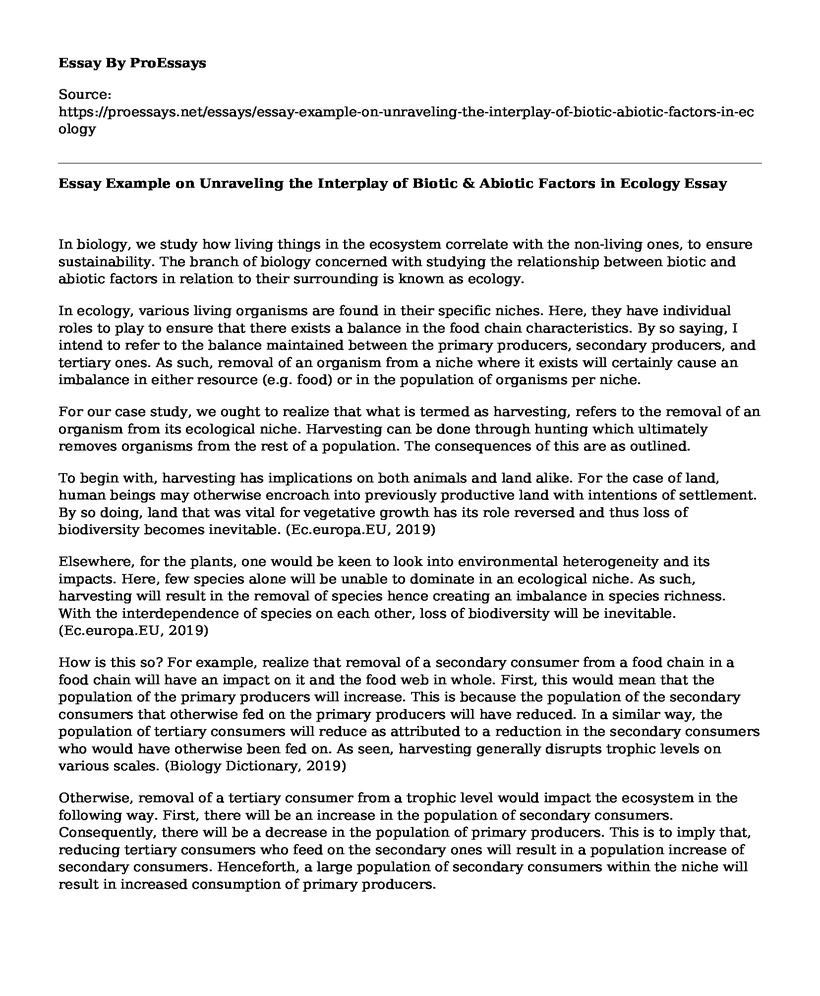In biology, we study how living things in the ecosystem correlate with the non-living ones, to ensure sustainability. The branch of biology concerned with studying the relationship between biotic and abiotic factors in relation to their surrounding is known as ecology.
In ecology, various living organisms are found in their specific niches. Here, they have individual roles to play to ensure that there exists a balance in the food chain characteristics. By so saying, I intend to refer to the balance maintained between the primary producers, secondary producers, and tertiary ones. As such, removal of an organism from a niche where it exists will certainly cause an imbalance in either resource (e.g. food) or in the population of organisms per niche.
For our case study, we ought to realize that what is termed as harvesting, refers to the removal of an organism from its ecological niche. Harvesting can be done through hunting which ultimately removes organisms from the rest of a population. The consequences of this are as outlined.
To begin with, harvesting has implications on both animals and land alike. For the case of land, human beings may otherwise encroach into previously productive land with intentions of settlement. By so doing, land that was vital for vegetative growth has its role reversed and thus loss of biodiversity becomes inevitable. (Ec.europa.EU, 2019)
Elsewhere, for the plants, one would be keen to look into environmental heterogeneity and its impacts. Here, few species alone will be unable to dominate in an ecological niche. As such, harvesting will result in the removal of species hence creating an imbalance in species richness. With the interdependence of species on each other, loss of biodiversity will be inevitable. (Ec.europa.EU, 2019)
How is this so? For example, realize that removal of a secondary consumer from a food chain in a food chain will have an impact on it and the food web in whole. First, this would mean that the population of the primary producers will increase. This is because the population of the secondary consumers that otherwise fed on the primary producers will have reduced. In a similar way, the population of tertiary consumers will reduce as attributed to a reduction in the secondary consumers who would have otherwise been fed on. As seen, harvesting generally disrupts trophic levels on various scales. (Biology Dictionary, 2019)
Otherwise, removal of a tertiary consumer from a trophic level would impact the ecosystem in the following way. First, there will be an increase in the population of secondary consumers. Consequently, there will be a decrease in the population of primary producers. This is to imply that, reducing tertiary consumers who feed on the secondary ones will result in a population increase of secondary consumers. Henceforth, a large population of secondary consumers within the niche will result in increased consumption of primary producers.
Conclusion
In conclusion, the removal of an organism from its niche would result in changes as seen in the various trophic levels. This is to say that, for instance, removal of a primary producer would result in its population decrease hence a resultant decreased population of both secondary and tertiary consumers. As such, species should be replaced whenever they are removed from a given ecological niche. This will go a long way in ensuring species heterogeneity hence a sustainable ecosystem.
References
Ec.europa.eu. (2019). [Online] Available at: http://ec.europa.eu/environment/integration/research/newsalert/pdf/196na5_en.pdf [Accessed 2 May 2019].
Biology Dictionary. (2019). Trophic Level - Definition and Examples | Biology Dictionary. [Online] Available at: https://biologydictionary.net/trophic-level/ [Accessed 2 May 2019].
Cite this page
Essay Example on Unraveling the Interplay of Biotic & Abiotic Factors in Ecology. (2023, Jan 10). Retrieved from https://proessays.net/essays/essay-example-on-unraveling-the-interplay-of-biotic-abiotic-factors-in-ecology
If you are the original author of this essay and no longer wish to have it published on the ProEssays website, please click below to request its removal:
- The Process of Blood Flow and Sporting Events
- Paper Example on Natural Risks
- Essay Sample on Ergot Theory
- Essay Sample on Mountain Formation: Orogeny, Volcanism & Tectonics
- Essay Example on Unleashing the Potential of Solar Energy: A History of Innovation
- Essay Example on Ocean Currents: Causes and Effects
- Protecting Endangered Species - Essay Sample







